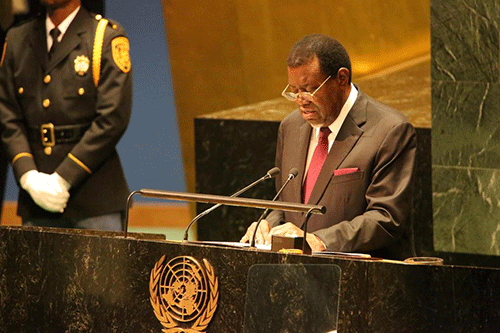Paheja Siririka
Otniel Hembapu
President Hage Geingob has said the terrifying gap between the wealthy and the marginalised is not just a moral concern but also a threat to global stability and harmony.
He made these remarks while addressing delegations at the 78th session of the UN General Assembly in New York.
There is a need to create an environment where prosperity is shared and inclusive.
“In our collective pursuit of the 2030 Agenda, Namibia looks forward with hope and optimism to the Summit of the Future next year as an opportunity to prioritise meaningful reforms that can reinvigorate the global goals to give impetus to the broader system-wide UN-reform agenda,” he said.
The 78th session of the UN General Assembly marks a crucial milestone in the journey towards achieving the 2030 Agenda and the urgent need to put the 17 Sustainable Development Goals (SDGs) back on track.
Geingob noted that Namibia also welcomes UN2.0 and the “Quintet of Change”, aiming to provide the United Nations family with cutting-edge capabilities in data, digital innovation and expertise in order to deliver better and effective member state support to accelerate development.
“Inclusivity spells harmony and exclusivity spells conflict. The continued advocacy for gender equality is core to our collective journey toward a just and inclusive world. Therefore, advocating for gender equality is not only a matter of fairness; it is an essential step toward unlocking innovation, diversity and social cohesion,” he said.
Geingob boasted: “We are indeed proud to be ranked by the World Economic Forum Global Gender Gap Report of 2023 as the 8th country in the world for efforts to close the gender gap. In addition to having 44% female representation in Parliament, we have women in the positions of prime minister and deputy prime minister, and two-thirds of our key banking institutions are headed by women. In the same vein, we believe in promoting inclusive and effective governance that ensures the youth are integrated into decision-making structures to play their part in a future they have helped to shape”.
Technology advances
He said the rapid advances in technology, quantum computing and Artificial Intelligence (AI) are transforming the global landscape, offering unprecedented challenges and opportunities for growth and development. Therefore, developing countries should not be left behind in this digital revolution.
Access to technology can bridge gaps in education, healthcare and economic development, propelling nations toward progress.
We must navigate technological challenges and harness opportunities by fostering an environment that is conducive to technology transfer, technology adoption, skills development and collaboration.
Geingob also revealed that Namibia is working with Compagnie Maritime Belge (CMB-Tech), a shipping company from Belgium, with plans to build a clean ammonia bunkering facility in Walvis Bay, at a cost of more than €2.2 billion, in partnership with Namibia’s Olthaver and List company.
“On 28 September 2023, this partnership is expected to reveal plans to construct their first Namibian Green Hydrogen multi-modal service station,” he said.
Energy boom
Wooing investors and leaders of various multinational conglomerates during the Africa-American Institute 70th anniversary gala event held in New York on Tuesday, Geingob said member states of the EU and others have already jumped on the many opportunities that the country’s energy and mineral sectors have to offer, but he is worried about the delay of American investors.
President Geingob also described Namibia’s energy and mineral resource boom as a lifetime opportunity that has unmatched potential to transform economies worldwide, and one which American investors should not miss out on.
Namibia’s multi-billion-dollar green hydrogen projects are at the planning stage, while oil discoveries at various sites are still undergoing an appraisal process to determine commercial viability – but all indicators are showing positive signs.
“As you all know, Namibia is a free and democratic country with so many investment opportunities. We are sitting now with new technologies and discoveries that have immense potential. When I go to Europe these days, everybody there wants to come to Namibia because we now have green hydrogen, which is a new and clean energy source for the future. European Union countries and others have realised it, and they are all coming to sign agreements with us,” said Geingob.
He added: “But I’m worried because Americans are left out in that area. So, our doors are open to American investors who want to come to Namibia and invest in this new and clean energy source. Not only that, but we also have many other rare mineral resources, such as lithium and so on, which everybody is looking for. Namibia has resources that you might not find elsewhere in the world, but the problem is that we cannot develop them ourselves; that is why we need investors to come”.
Taking the lead
With an integrated hydrocarbon and renewable energy strategy, combined with promising oil and gas discoveries, Namibia is at the forefront of Africa’s energy boom.
With hydrogen production, Namibia could boost its GDP by USD15-billion to USD20-billion per year, create more than 100 000 domestic jobs, export 14GW of clean power to the Southern African Power Pool and reduce Green House Gas (GHG) emissions by 45-60 million tonnes of carbon dioxide equivalent per year by 2040.
Last year, Shell and TotalEnergies, as well as their joint venture partners led commercial discoveries of light oil in the Graff-1 well and Venus-1X wildcat well, respectively.
Caption:



